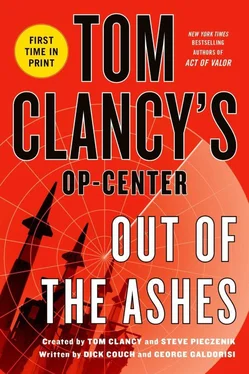Finally, he spoke. “The United States was never happy the Assad regime was close to Iran, and they thought when we replaced it, that would change. As you all know, we continue to get a great deal of support from Iran. The United States also thought we might move closer to Saudi Arabia but you know we continue to have issues with those responsible for Islam’s two most holy sites, Mecca and Medina.”
“But, don’t you see,” the second man said, “it’s exactly because we are united with Iran to challenge their Saudi lackeys that the United States now poses a threat to our nation. The Saudis are alarmed and that has translated to their benefactors being alarmed.”
“The Saudi Royal Court had become secularized and their moral leadership of Islam is weakening,” Shaaban replied. “We will fill that void. What the Americans do is not my concern.”
Hafez Shaaban did not want to be distracted by international events while he consolidated power within his country. He knew he didn’t have complete control of all groups within Syria. He feared that the same revolution that brought him into power might be pulling apart his country and making it another Lebanon. He depended on his close advisors to keep track of external events for him. He would listen to them, and he would do what was necessary, but he felt with all his soul his primary focus needed to be within the borders of Syria.
USS Normandy
(March 18, 1615 Arabia Standard Time)
Aboard Normandy, Laurie Phillips was learning more by the minute, she just wasn’t sure precisely what it was. Whether intuition, or a hunch, she knew there was something inconsistent about the Global Hawk video she had replayed a half dozen times.
Laurie reflected a moment on how different her perspective was from that of the officers, chiefs, and sailors aboard Normandy . They were operators, not analysts. They were used to reacting to a situation and taking action. They saw what they saw in the Global Hawk video and took that as ground truth. Now their focus was on informing their chain of command of what they had seen and preparing their ship to carry out the orders of that chain of command should they decide to act on this information. Laurie was coming to realize the officers and crew of Normandy seemed certain their chain of command would take action.
As an analyst, however, Laurie resisted the temptation to jump to the same conclusion the others had drawn from the video footage. She had trained all her post — Marine Corps professional life to do exactly the opposite. She was supposed to challenge every assumption, to look at things in an objective manner, and to put even the most compelling evidence to the closest scrutiny with the ultimate goal of discovering the real truth.
As she subjected the Global Hawk video to this examination, she sensed there was something wrong with the shadows on different parts of the video and with the latitude and longitude displayed in the corner of the streaming video. She hesitated to ask any of the sailors or officers in CDC about these anomalies, even though they were the people who respected her professionally. No, she would figure this out herself.
Where could she go for help to get more information? This was pretty esoteric stuff she was dealing with. The officers on board Normandy were operators and the nuances of how the video was captured, what it conveyed, and its overall validity was not their concern. Laurie knew a lot of the “why” behind the “what” and she had her suspicions about what she was seeing. She just needed to vet her thoughts and suspicions with a professional colleague with a better understanding of these comms and sensor packages. That would help her validate what she was seeing.
Laurie knew precisely who that person was. All it would take would be to simply type his address into the Outlook mail queue, but was that the only way to find out what she wanted to discover? Wasn’t there a less risky way, one that wouldn’t open up old personal and professional wounds? Laurie was oblivious to everything around her in CDC as she found herself frozen in inaction for a tiny eternity.
* * *
Seven time zones away, in the White House Situation Room, less than twelve hours since the Global Hawk video had hit the Sit Room staff, the president’s small circle of senior advisors were trying to come to grips with what this all meant, and what, if anything, they could do about it. But their underlying core impulse was to do something. The Sit Room director, Joe Wexler, took little solace in getting it right in his discussions with his deputy, Rick George, the day before. The Sit Room staff had remained in place throughout the night orchestrating video teleconferences, pulling together intelligence reports, and preparing for the onslaught of action anticipated today.
President Wyatt Midkiff opened the meeting with his top advisors in the Sit Room’s larger secure conference room. “All right, ladies and gentlemen. I know it’s early, and we all are anticipating a long day, but this is something we need to deal with in real time. Adam, give us a recap, will you?”
The director of national intelligence, Adam Putnam, recapped what they all already knew. A DF-21D ballistic missile site had sprung up, seemingly overnight, in the Syrian desert, and there appeared to be fissionable material at hand that could be readily fitted into a warhead atop one of the four missiles at the site. Subsequent passes by the Global Hawk confirmed a great deal of activity by men in uniform, day and night, at the site.
The president turned to his secretary of defense, Jack Bradt.
“Jack, we know what we’re looking at. Now what do we make of it?”
“Mr. President, as Adam has described, there’s no new intelligence. We don’t know anything we didn’t know yesterday. We, Defense, and the intelligence community are moving to increase surveillance of Syria with various imagery and communications assets. We’re reasonably confident there won’t be any more surprises.”
“Good, Jack. Good.”
“I guess the only thing to add, Mr. President, and I hesitate to belabor the obvious, and I’ve conferred with State on this,” Bradt continued, nodding toward the secretary of state, “but Syria is a sovereign country. They live in a pretty bad neighborhood, and the flip side of all this is perhaps it’s just something that bears watching.” Bradt knew what he was suggesting to the president was contentious. He just didn’t know how much so.
“Jack, dang it. You’re my SECDEF! If anyone is leaning forward on this, I need it to be you.”
Bradt started to speak, but the president was in broadcast mode.
“Does 2009 ring a bell for anyone? Christmas maybe? Remember some guy named Umar Abdul Mutallab, a.k.a. the underwear bomber. We almost lost Northwest Flight 253 that day and do you remember why? Anyone?”
There was a nanosecond of silence in the Sit Room, so Midkiff plowed ahead.
“Because, as one of my predecessors in this office said, ‘We failed to connect the dots.’ He said it plain as day, and had we lost Northwest Flight 253 I’m pretty sure Barack Obama would have been a one-term president. Adam, I needn’t remind you, one of your predecessors was hustled out of his job as DNI pretty quick over that episode, and nothing happened; the flight crew did stop the underwear bomber before he took down that plane.”
No one spoke. The president’s body language made it clear they shouldn’t.
“So do we see any dots to connect here? We surge our forces forward to the Gulf as is our right in order to deal with threatening behavior from Iran. And just when we have five big deck ships within range of them, then what? Syria, who is clearly Iran’s proxy in the region, just happens to roll out the one missile in the whole God-danged world that can hit a moving, let alone stationary, aircraft carrier or big-deck amphib. Do I really need to have State here give you all a tutorial on the long-standing tension between us and Syria? Or how that has ratcheted up in recent months?”
Читать дальше












